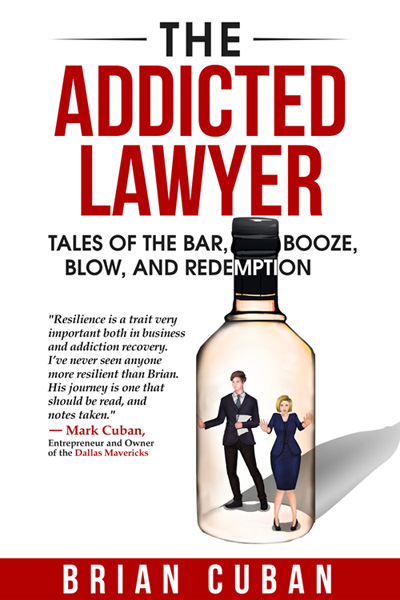Brian Cuban: The Addicted Lawyer
May 2, 2018

Attorney Brian Cuban has struggled with mental health issues throughout his life. Substance abuse, addiction, and eating disorders have negatively impacted both his personal and professional relationships. Thanks to help from friends, family, and mental health professionals, he recently celebrated 11 years of sobriety.
Brian will discuss his latest book, The Addicted Lawyer, at the library May 9 at 7 pm. Representatives from the National Alliance on Mental Illness will be on hand to provide resources on how to support loved ones with mental health issues.
We recently asked Brian to answer a few questions ahead of his visit:
Congratulations on 11 years of sobriety. In a recent post on your blog, you wrote that when you look in the mirror now, you no longer see an alcoholic, you see someone who doesn’t drink. What’s the distinction there?
The term “alcoholic” is not a medical diagnosis. The term has been around since the late 1700’s but was really taken mainstream by Alcoholics Anonymous. It can represent a wide spectrum of problem drinking issues on the alcohol use disorder spectrum. I see it as a term of inclusiveness in that it's helpful with peer support. Being in a room with other people who identified in that way was very important to me early in my recovery. As I have grown and found multiple peer support outlets, it is less important to me personally to apply that term to my journey.
You connect the trauma you experienced being bullied and body shamed as a kid to your struggles with bulimia, Body Dysmorphic Disorder, and an addiction to cocaine and alcohol. What do you wish someone would have told the 13-year-old Brian Cuban that may have helped him cope?
That he is loved. That it is OK to love himself. That he is enough.
You see a correlation between career and addiction, particularly for those in the legal profession. Do you think people with addiction issues are drawn to that profession or do the stresses of the work lead to the addiction?
I think the legal profession tends to attract Type A personalities who tend to put work ahead of taking care of themselves. Of course, the paradox there is that a person probably cannot do their best work if they are not taking care of themselves from a mental health and wellness standpoint. In my experience, lawyers also tend to be resistant to dealing with underlying personal issues— that may even date to childhood—and that may make them more vulnerable to being triggered by the stress of the job into potentially harmful coping mechanisms such as problem drinking.
What was the turning point for you when you decided to get help for your substance abuse problems and what support did you get from family, friends, colleagues, and mental health professionals?
The turning point was Easter weekend 2007 after a drug- and alcohol-induced blackout. My girlfriend Amanda (now wife) drove me to a local psychiatric hospital. It was my second trip there, the first being after becoming suicidal in 2005. While we were waiting for intake, I had my recovery tipping point moment. It occurred to me that there would not be a third trip back because I’d probably be dead. I also did not want to lose my family who I had been distancing from more and more.
The support from my family has been wonderful. Amanda stood by me and supported me while I found recovery and rebuilt the broken trust. It was a long process. We dated over ten years before getting engaged and then married. My brothers, mother, and father have also been supportive. They are of course happy to see me happy and healthy and in long-term recovery, achieving things I never dreamed possible on April 7, 2007—the day before I began sobriety.
I knew nothing of what was available from a professional standpoint as my legal career had collapsed long before that moment. No colleague ever reached out to me to tell what resources were available, nor did I ask. That void of support and information in the profession is a big reason I wrote The Addicted Lawyer.
I received and still receive mental health therapy. I have been seeing a psychiatrist for almost 15 years. I take anti-depressants for my clinical depression which I still deal with even in recovery. They often overlap but can exist independently.
What is the most important thing family and friends can do when someone they love is struggling with addiction or a mental health issue?
Letting them know on a regular basis that they are there for them. Educate themselves on what recovery paths to walk with their loved ones or colleagues if they are ready to take it. Never, ever mind your own business if you think someone is struggling. Reach out. Reach out again. They may not want your help. They may not appreciate your concern, but the easiest thing to say no to is nothing. Be ready for the yes. You will change a life.

Come listen to Brian Cuban talk about his journey with mental health issues and his book, The Addicted Lawyer. Copies will be available for purchase following the presentation and discussion.
Wednesday, May 9, 2018
7:00 pm - 8:30 pm
Radmacher Meeting Room